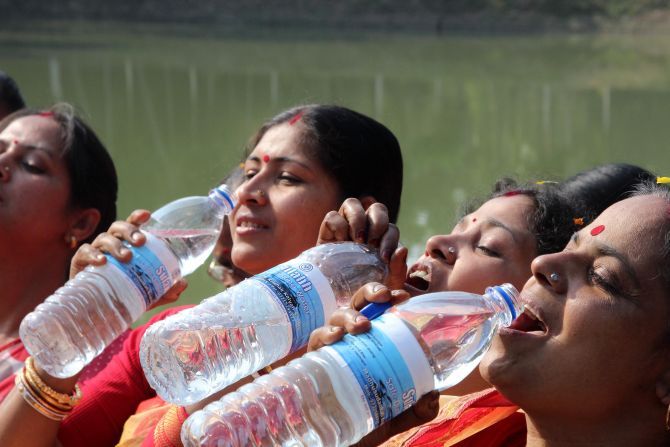A health catastrophe more devastating than the Bhopal gas tragedy and the Chernobyl nuclear tragedy has unfolded in West Bengal, warns a new scientific report.
But a simple project to provide arsenic-free water gives villagers fresh hope. Rashme Sehgal reports for Rediff.com

Jharna Das, who lives in Tagariya village located 14 kilometres from the Bangladesh border, is a victim of drinking arsenic contaminated water.
"Our entire family has suffered from drinking polluted water. We have skin infections and suffer from kidney and bladder problems," says Jharna.
Around 50 people have died of cancer from drinking arsenic-laced water in and around Tagariya in the last few years. Tagariya village is among the nine districts of West Bengal that gets contaminated water, adversely impacting their lives.
"We have been going repeatedly to both private and government doctors, but we continue to suffer," says Jharna who lives with her son Swapan, daughter-in-law and grandchildren.
"Mamata Banerjee (Bengal's chief minister) promised us clean drinking water and though the state government has dug new tube wells, these are shallow and our drinking water problem remains unsolved," she adds.
Swapan, who rears goats for a living, raises the sleeves of his shirt to show black patches on both his arms.
"Even though we filter the water we drink, it is not arsenic free. Our ground water is contaminated and our water supply comes from shallow tube wells," he says.
Arsenic is a metal that has no smell or taste and depending on local environmental conditions, it can leach from soil or mineral deposits into ground water.

A recent study conducted by Dr D Nagdeve and Dr A Chattopadhya titled 'Environmental Health Catastrophe in Eastern India: A Case Study of Arsenic Morbidity in West Bengal' has concluded that a health catastrophe more devastating than the size of the Bhopal gas tragedy of 1984 and the Chernobyl nuclear tragedy of 1986 has unfolded in West Bengal.
Millions of people drink groundwater with arsenic concentrations much above that permissible by the World Health Organisation.
The study has shortlisted 2,600 affected villages located in the 24 Pargannas North and South, Kolkata, Hoogly, Howrah, Bardhaman, Murshidabad and Maida districts of West Bengal.
The problem of arsenic contamination extends to a large part of Bangladesh where a sizeable population has been found to be affected by the same problem. The study found that a higher concentration of men suffer from the disease as compared to women.

Determined to find a solution to their water problem, residents of the nearby village of Gaighata -- many of who are members of the Madhusudan Cooperative Society -- met with its chairperson Haladhar Sarkar to seek help.
"We are a large cooperative. Around 145 women work with us in self-help groups and many suffered from skin infections which dermatologists identified as being caused by arsenic in the drinking water," says Sarkar.
"We began making enquiries and learnt that Sulabh (the social service organisation) was working in this area. We reached out to them to find out if they could help us provide clean drinking water. We contacted (Sulabh founder) Dr Bindeshwar Pathak who agreed to help us by using an innovative model developed by the French group 1001 Fontaines," Sarkar adds.
"Basically, they follow a four-stage purification process that uses water stored in ponds. The society owns one pond which is around 18-feet deep and is fed by rain water. The other two ponds are owned by local people, but they have been generous and did not hesitate to let us use it. The society invested Rs 10 lakh (Rs 1 million) in the project while Sulabh gave another Rs 10 lakh which helped with the equipment and other costs. We are now in a position to sell this purified water at 50 paisa per litre," says Sarkar.
"We provide this water to BPL (Below Poverty Line) families and local schools free of cost," adds Sarkar, "We also bought a delivery vehicle that goes from house to house distributing 20 litres to each family per day. At present we sell 1,000 litres of water per day earning Rs 100."
Dr Pathak, who inaugurated the pilot water purification project in Gaighata in February, is delighted at the villagers' initiative.
"The new water purification process has a capacity to produce 8,000 litres of potable water per day at a cost of ten paisa. But it will be sold at 50 paisa per litre as this will include costs like distribution and storing. Even people in neighbouring villages can use this water," points out Dr Pathak.
"This is the cheapest price for clean drinking water anywhere in the world," says the Sulabh founder. It is significant that villagers in the neighbouring areas have realised that if they come together and make a similar request, they too can be in a position to launch a similar project, he adds.
Sulabh has been providing inputs for four similar drinking water projects in Murshidabad and Malda districts, with another coming up at Assi Ghat in Varanasi.

Sumita Ghosh from Gaighata village is delighted with the scheme. "I was admitted to a hospital twice for treatment of skin lesions on my feet and legs. I am happy that now my family can get clean drinking water," she says.
Another Gaighata villager, Bullu Biswas, sounds sceptical. "The scheme has to be kept up. It should not collapse as it often happens with government schemes," he says.
Shantanu Ghosh, who works for the Madhusudan Cooperative Society, says, "Villagers continue to use untreated water for washing utensils, clothes and bathing. Our focus is that they drink treated water."
The Kolkata-based Indian Institute of Hygiene and Public Health has warned that children are most susceptible to arsenic poisoning. Medical practitioners at the institute warn of the increasing neurological problems witnessed in arsenic affected districts. The poisoning also causes the inability of wounds to heal which results in gangrene setting in, leading to amputations.
The success story of Gaighata village has spread to other arsenic affected districts. Sulabh officials say they receive a large number of enquiries for which modalities are being worked out.
Photographs: Rajeev Tyagi










